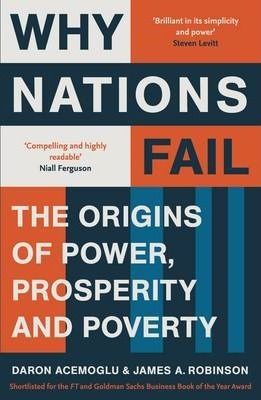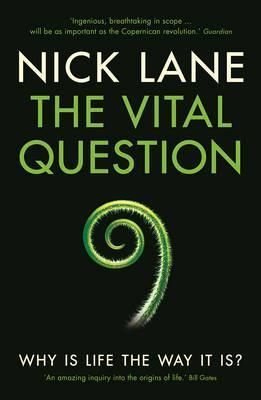Profile Books strana 7 z 22
vydavateľstvo
Why Nations Fail
Shortlisted for the Financial Times and Goldman Sachs Business Book of the Year Award 2012.
Why are some nations more prosperous than others? Why Nations Fail sets out to answer this question, with a compelling and elegantly argued new theory: that it is not down to climate, geography or culture, but because of institutions. Drawing on an extraordinary range of contemporary and historical examples, from ancient Rome through the Tudors to modern-day China, leading academics Daron Acemoglu and James A. Robinson show that to invest and prosper, people need to know that if they work hard, they can make money and actually keep it - and this means sound institutions that allow virtuous circles of innovation, expansion and peace.
Based on fifteen years of research, and answering the competing arguments of authors ranging from Max Weber to Jeffrey Sachs and Jared Diamond, Acemoglu and Robinson step boldly into the territory of Francis Fukuyama and Ian Morris. They blend economics, politics, history and current affairs to provide a new, powerful and persuasive way of understanding wealth and poverty.
The Question Book
What would be your ideal job if you didn't have to worry about money? Would you like to have more responsibility or less? How far would you go for a promotion? When did you last stand up for what you believe in? What are you afraid of?
In this unique handbook to your own life and work, there are no right or wrong answers: only honest ones. Featuring sections on subjects everyone can relate to, from the professional (work and finance), to the personal (sex and relationships), The Question Book can be used alone, like a journal; or with a colleague, partner or friend. It will probe and enlighten on everything, including what your boss really thinks about you, whether you are in the right job, and what motivates you to get out of bed every morning. These wide-ranging questions - which provoke short 'yes or no's as well as open-ended responses that dig deeper - are pertinent, direct, and compulsively fun to answer. In The Question Book, you are under the spotlight. And only you have the answer.
Vypredané
12,30 €
12,95 €
Identity
Increasingly, the demands of identity direct the world's politics. Nation, religion, sect, race, ethnicity, gender: these categories have overtaken broader, inclusive ideas of who we are. We have built walls rather than bridges.
The result: increasing in anti-immigrant sentiment, rioting on college campuses, and the return of open white supremacy to our politics. In 2014, Francis Fukuyama wrote that American and global institutions were in a state of decay, as the state was captured by powerful interest groups. Two years later, his predictions were borne out by the rise to power of a series of political outsiders whose economic nationalism and authoritarian tendencies threatens to destabilise the entire international order.
These populist nationalists seek direct charismatic connection to 'the people', who are usually defined in narrow identity terms that offer an irresistible call to an in-group and exclude large parts of the population as a whole. Identity is an urgent and necessary book: a sharp warning that unless we forge a universal understanding of human dignity, we will doom ourselves to continual conflict.
Vypredané
19,90 €
20,95 €
Vital Question
Why is life the way it is? Bacteria evolved into complex life just once in four billion years of life on earth-and all complex life shares many strange properties, from sex to ageing and death. If life evolved on other planets, would it be the same or completely different?
In The Vital Question, Nick Lane radically reframes evolutionary history, putting forward a cogent solution to conundrums that have troubled scientists for decades. The answer, he argues, lies in energy: how all life on Earth lives off a voltage with the strength of a bolt of lightning. In unravelling these scientific enigmas, making sense of life's quirks, Lane's explanation provides a solution to life's vital questions: why are we as we are, and why are we here at all?
This is ground-breaking science in an accessible form, in the tradition of Charles Darwin's The Origin of Species, Richard Dawkins' The Selfish Gene, and Jared Diamond's Guns, Germs and Steel.
Civilisations First Contact The Cult of Progress
Companion to the major new BBC documentary series CIVILISATIONS, presented by Mary Beard, David Olusoga and Simon SchamaOscar Wilde said 'Life imitates Art far more than Art imitates Life.' Was he right? In Civilisations, David Olusoga travels the world to piece together the shared histories that link nations. In Part One, First Contact, we discover what happened to art in the great Age of Discovery, when civilisations encountered each other for the first time. Although undoubtedly a period of conquest and destruction, it was also one of mutual curiosity, global trade and the exchange of ideas.
In Part Two, The Cult of Progress, we see how the Industrial Revolution transformed the world, impacting every corner, and every civilisation, from the cotton mills of the Midlands through Napoleon's conquest of Egypt to the decimation of both Native American and Maori populations and the advent of photography in Paris in 1839. Incredible art - both looted and created - relays the key events and their outcomes throughout the world.
Vypredané
18,01 €
18,96 €
Civilisations: How Do We Look/The Eye of Faith: As seen on TV
Companion to the major new BBC documentary series CIVILISATIONS, presented by Mary Beard, David Olusoga and Simon SchamaThe idea of 'civilisation' has always been debated, even fought over. At the heart of those debates lies the big question of how people - from prehistory to the present day - have depicted themselves and others, both human and divine. Distinguished historian Mary Beard explores how art has shaped, and been shaped by, the people who created it.
How have we looked at these images? Why have they sometimes been so contentious? In Part One, she examines how the human figure was portrayed in some of the earliest art in the world - from the gigantic stone heads carved by the Olmec of Central America to the statues and pottery of the ancient Greeks to the terracotta army of the first emperor of China. And she explains how one particular version of representing the human body, which goes back to the ancient world, still influences (and sometimes distorts) how people in the West see their own culture and that of others. Throughout this story, she is concerned not only with the artists who made images, but with those who have used them, viewed them and interpreted them.
In other words: How Do We Look? In Part Two, Mary Beard turns to the relationship between art and religion. For centuries, religion has inspired art: from the Hindu temple at Angkor Wat to the Christian mosaics of Ravenna to the exquisite calligraphy of Islamic mosques. But making the divine visible in the human world has never been simple.
All religions have wrestled with idolatry and iconoclasm, destroying art as well as creating it - and asking how to look with The Eye of Faith.
Vypredané
18,01 €
18,96 €
Babel
If you were to master the twenty languages discussed in Babel, you could talk with three quarters of the world's population. But what makes these languages stand out amid the world's estimated 6,500 tongues?Gaston Dorren delves deep into the linguistic oddities and extraordinary stories of these diverse lingua francas, tracing their origins and their sometimes bloody rise to greatness. He deciphers their bewildering array of scripts, presents the gems and gaps in their vocabularies and charts their coinages and loans.
He even explains how their grammars order their speakers' worldview. Combining linguistics and cultural history, Babel takes us on an intriguing tour of the world, addressing such questions as how tiny Portugal spawned a major world language and Holland didn't, why Japanese women talk differently from men, what it means for Russian to be 'related' to English, and how non-alphabetic scripts, such as those of India and China, do the same job as our 26 letters. Not to mention the conundrums of why Vietnamese has four forms for 'I', or how Tamil pronouns keep humans and deities apart.
Babel will change the way you look at the world and how we all speak.
Vypredané
16,10 €
16,95 €
Bad Blood
FROM THE INTERNATIONALLY BESTSELLING AUTHOR OF THE BOOK OF MIRRORS
You can't trust your own memories. You can't trust other people's. So how do you know what really happened that night? One rainy night in New York, psychologist James Cobb gives a talk on the art of recovering lost memories.
Afterwards, he's approached by a stranger: a dying man who, forty years ago, woke up in a hotel room with a murdered woman, and no memory at all of what happened. Now, he needs to know whether he was an innocent bystander - or a killer. Intrigued, James begins to unpick the tangled threads of this decades-old mystery.
But everyone involved has a different story to tell, and every fact he uncovers has another interpretation. As his interest becomes an obsession, and secrets from his own past start to surface, he begins to suspect that someone has buried the truth deep enough to hide it forever. For fans of Joel Dicker, Peter Swanson and SJ Watson, Bad Blood tells a gripping story of memory, motives, and how little we really know about ourselves
Vypredané
16,10 €
16,95 €
Conspiracy
In 2016, one of the giants of modern journalism fell: Gawker Media, infamous for saying what other outlets wouldn't say, was sued for publishing Hulk Hogan's sex tape, lost the case and went bust. After countless other lawsuits it seemed that Gawker had finally run out of luck. But luck had nothing to do with it.
Peter Thiel, PayPal founder and billionaire investor, had masterminded the whole thing. Still furious at an article that had outed him ten years previously, and increasingly disgusted at Gawker's unscrupulous reporting methods, Thiel had spent nearly a decade meticulously plotting a conspiracy that would lead to the demise of Gawker and its founder, Nick Denton. After a multi-year proxy war through the Florida legal system, the settlement of $140million in favour of Hogan ended it.
The verdict would stun the world and so would Peter's ultimate unmasking as the man who had set it all in motion. Why had he done this? How had no one discovered it? What would this mean--for free speech? For privacy? For culture?In Holiday's masterful telling of this nearly unbelievable conspiracy, informed by exclusive interviews with all the key players, this case transcends the narrative of how one billionaire took down a media empire or the current state of the free press. It's a study in power, strategy, and one of the most wildly ambitious - and successful - secret plots in recent memory.
Vypredané
18,00 €
18,95 €
Extinctions
Winner of the prestigious Miles Franklin Award
Professor Frederick Lothian, retired engineer, world expert on concrete and connoisseur of modernist design, has quarantined himself from life by moving to a retirement village. Surrounded and obstructed by the debris of his life, he is determined to be miserable, but is tired of his existence and of the life he has chosen.
When a series of unfortunate incidents forces him and his neighbour, Jan, together, he begins to realise the damage done by the accumulation of a lifetime's secrets and lies, and to comprehend his own shortcomings. Finally, Frederick Lothian has the opportunity to build something meaningful for the ones he loves.
Humorous, poignant and galvanising, this is a novel about all kinds of extinction - natural, racial, national and personal - and what we can do to prevent them.
Vypredané
16,10 €
16,95 €
How Language Began
In his groundbreaking new book Daniel Everett seeks answers to questions that have perplexed thinkers from Plato to Chomsky: when and how did language begin? What is it? And what is it for?
Daniel Everett confounds the conventional wisdom that language originated with Homo sapiens 150,000 years ago and that we have a 'language instinct'. Drawing on evidence from a wide range of fields, including linguistics, archaeology, biology, anthropology and neuroscience, he shows that our ancient ancestors, Homo erectus, had the biological and mental equipment for speech one and half million years ago, and that their cultural and technological achievements (including building ocean-going boats) make it overwhelmingly likely they spoke some kind of language.
How Language Began sheds new light on language and culture and what it means to be human and, as always, Daniel Everett spices his account with incident and anecdote. His book is convincing, arresting and entertaining.
Vypredané
14,20 €
14,95 €
Hungary
The victors of the First World War created Hungary from the ruins of the Austro-Hungarian empire, but, in the centuries before, many called for its creation. Norman Stone traces the country's roots from the traditional representative councils of land-owning nobles to the Magyar nationalists of the nineteenth century and the first wars of independence. Hungary's history since 1918 has not been a happy one.
Economic collapse and hyperinflation in the post-war years led to fascist dictatorships and then Nazi occupation. Optimism at the end of the Second World War ended when the Iron Curtain descended, and Soviet tanks crushed the last hopes for independence in 1956 along with the peaceful protests in Budapest. Even after the fall of the Berlin Wall, consistent economic growth has remained elusive.
This is an extraordinary history - unique yet also representative of both the post-Soviet bloc and of nations forged from the fall of empires.
Vypredané
19,90 €
20,95 €
Melmoth
Twenty years ago Helen Franklin did something she cannot forgive herself for, and she has spent every day since barricading herself against its memory. But the sheltered life she has crafted for herself is about to change. A strange manuscript has come into her possession, and its contents have the power to unravel every strand of her fragile safety net.
It is filled with testimonies from the darkest chapters of human history, which all record sightings of a tall, silent woman in black, with unblinking eyes and bleeding feet: Melmoth, the loneliest being in the world. Condemned to walk the Earth forever, she tries to beguile the guilty and lure them away for a lifetime wandering alongside her. Everyone that Melmoth seeks out must make a choice: to live with what they've done, or be led into the darkness.
Despite her scepticism, Helen can't stop reading, or shake the feeling that someone or something is watching her. As her past finally catches up with her, she too must choose which path to take. Exquisitely written, and gripping until the very last page, this is a masterpiece of moral complexity, asking us profound questions about mercy, redemption, and how to make the best of our conflicted world.
Vypredané
18,00 €
18,95 €
Ocean of Sound
David Toop's extraordinary work of sonic history travels from the rainforests of Amazonas to the megalopolis of Tokyo via the work of artists as diverse as Brian Eno, Sun Ra, Erik Satie, Kate Bush, Kraftwerk and Brian Wilson. Beginning in 1889 at the Paris exposition when Debussy first heard Javanese music performed, Ocean of Sound channels the competing instincts of 20th century music into an exhilarating, path-breaking account of ambient sound. 'A meditation on the development of modern music, there's no single term that is adequate to describe what Toop has accomplished here ...
mixing interviews, criticism, history, and memory, Toop moves seamlessly between sounds, styles, genres, and eras' Pitchfork's '60 Favourite Music Books'
Vypredané
13,25 €
13,95 €
The Art of Logic
Emotions are powerful. In newspaper headlines and on social media, they have become the primary way of understanding the world. But strong feelings make it more difficult to see the reality behind the rhetoric.
In The Art of Logic, Eugenia Cheng shows how mathematical logic can help us see things more clearly - and know when politicians and companies are trying to mislead us. First Cheng explains how to use black-and-white logic to illuminate the world around us, giving us new insight into thorny political questions like public healthcare, Black Lives Matter and Brexit. Then she explains how logic and emotions, used side-by-side, can help us not only to be more rational individuals, but also to live more thoughtfully.
Clear-sighted, revelatory and filled with useful real-life examples of logic and illogic at work, The Art of Logic is an essential guide to decoding modern life.
Vypredané
18,00 €
18,95 €
The Bell of Treason
On returning from Germany on 30 September 1938 after his agreement with Hitler on the carve-up of Czechoslovakia, Neville Chamberlain addressed the British crowds: 'My good friends... I believe it is peace for our time. We thank you from the bottom of our hearts.
Go home and get a nice quiet sleep.' Winston Churchill commented: 'You have chosen dishonour and you will have war.' P.E. Caquet's history of the events leading to the Munich Agreement and its aftermath is told for the first time from the point of view of the peoples of Czechoslovakia. Basing his account on countless previously unexamined sources, including Czechoslovakian press, memoirs, private journals, military plans, parliamentary records, film and radio, Caquet presents one of the most shameful episodes in modern European history in a tragic new shape.
Among its his most explosive revelations is the strength of the French and Czechoslovak forces before Munich. Germany's dominance turns out to have been an illusion. The case for appeasement never existed.
The Czechoslovakian authorities were Cassandras in their own country, the only ones who could see Hitler's threat for what it was. In Caquet's devastating account, their doomed struggle against extinction and the complacency of their notional allies finally gets the memorial it deserves
Vypredané
27,51 €
28,96 €















